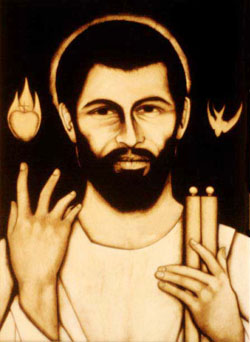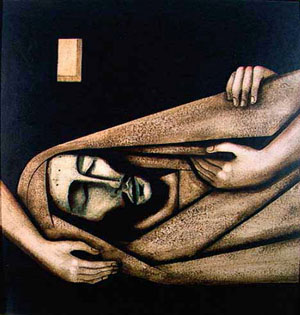 Aurelius
Augustine was born in 345 in the town of Tagaste, in Roman North Africa,
in what is today Algeria. His mother was Monica, a very devout Christian
who had a significant influence on her son’s life. His father, named Patricius,
was a pagan of significant status in society. Patricius became a Christian
shortly before his death. Aurelius
Augustine was born in 345 in the town of Tagaste, in Roman North Africa,
in what is today Algeria. His mother was Monica, a very devout Christian
who had a significant influence on her son’s life. His father, named Patricius,
was a pagan of significant status in society. Patricius became a Christian
shortly before his death.
Augustine was educated at Carthage where he enjoyed academic success.
He also enjoyed the party life, and at the age of 17 fell in love with
a woman whom he never named. They lived together unmarried for 13 years
and had a son whom Augustine named Adeodatus, meaning “gift from God.”
His son died in his youth.
At the age of 19, after reading Cicero's Hortensiusat, Augustine
fell in love with philosophy. He later wrote, “It gave me different values
and priorities. Suddenly every vain hope became empty to me, and I longed
for the immortality of wisdom with an incredible ardour in my heart.” While
he pursued Platonic philosophy and the theology of the Manichaens, a Christian
heretical sect, he became restless for truth and virtue. Shortly before
his 30th birthday, Augustine encountered Ambrose, the saintly bishop of
Milan. Augustine was moved by Ambrose’s example and his inspired teaching
and preaching of the gospel. At the age of 32 Augustine found peace with
God and was baptized by Ambrose during the Easter liturgy in 387. Augustine
returned to North Africa and formed a monastic community with a group of
friends. He was ordained a priest in 391 and became a noted preacher. In
396 he reluctantly became a bishop and remained the bishop of Hippo until
his death in 430. He left his monastic community, but continued to lead
a monastic life with the parish priests of Hippo in his episcopal residence.
Augustine died on August 28, 430, during the siege of Hippo by the Vandals.
Augustine was a prolific writer and original thinker. His numerous writings,
including theological treatises, sermons, scripture commentaries, and philosophical
dialogues, number into the hundreds. His autobiography, the Confessions,
was considerded the first Western autobiography. It was highly read among
his contemporaries and has continued as a classic throughout the ages.
Augustine is one of the most important figures in the development of
Western Christianity. He is esteemed as a great Latin church father and
a Doctor of the Roman Catholic Church. Many Protestants consider him to
be one of the theological fathers of Reformation teaching. Among Orthodox
he is called St. Augustine the Blessed. |

 Aurelius
Augustine was born in 345 in the town of Tagaste, in Roman North Africa,
in what is today Algeria. His mother was Monica, a very devout Christian
who had a significant influence on her son’s life. His father, named Patricius,
was a pagan of significant status in society. Patricius became a Christian
shortly before his death.
Aurelius
Augustine was born in 345 in the town of Tagaste, in Roman North Africa,
in what is today Algeria. His mother was Monica, a very devout Christian
who had a significant influence on her son’s life. His father, named Patricius,
was a pagan of significant status in society. Patricius became a Christian
shortly before his death.